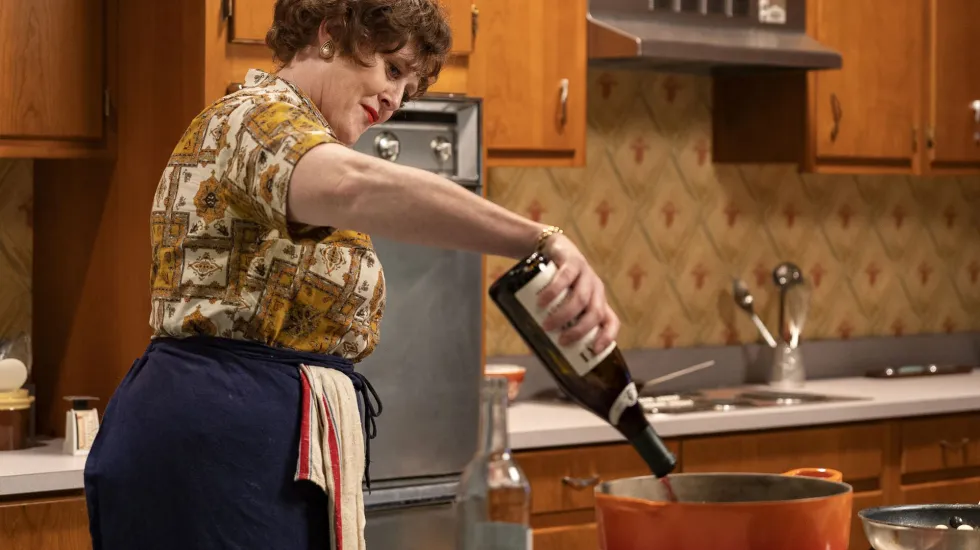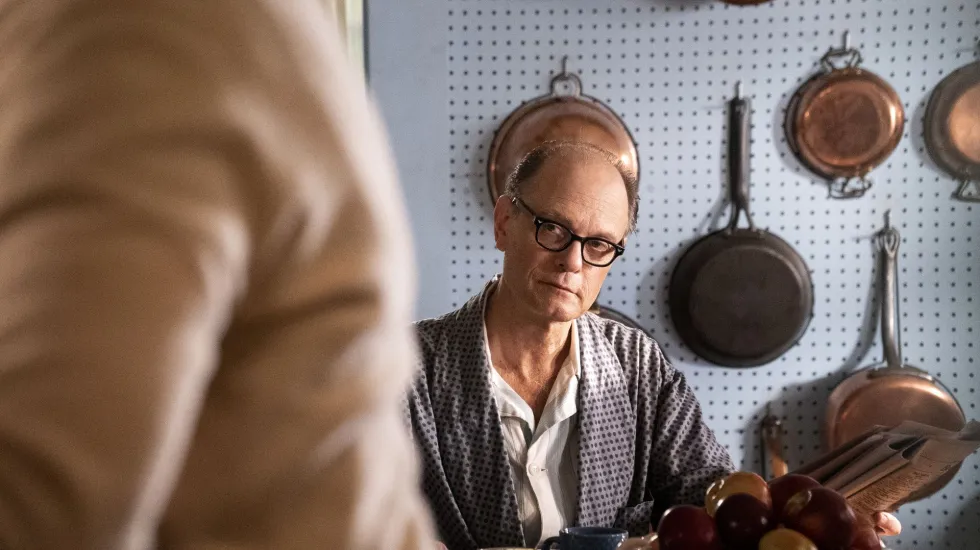
The TV and streaming menu in the 21st century has been loaded with cooking shows, from “Top Chef” to “Hell’s Kitchen” to “Good Eats” to “Cupcake Wars” to “Iron Chef” to “Cooked with Cannibas” to “Is It Cake?” and on and on it goes, and all those chefs and programs owe a debt of historical gratitude to Julia Child, the Babe Ruth—or should we say the Babe Didrikson Zaharias—of the modern television cooking show. Child was not the first woman to have a cooking show on TV, but when she created and hosted “The French Chef” for Boston public television in 1963 and eventually took it nationwide, she revolutionized home cooking for millions of Americans and changed the way we think about food.
Meryl Streep played Child to great effect in the 2009 film “Julie & Julia” and just last year we had the invaluable documentary “Julia,” and of course there’s a treasure trove of archival footage of Child in the TV kitchen—and yet the HBO Max limited bio-series “Julia” feels like a freshly baked, lovingly prepared and deliciously entertaining dish, focusing on the first season of Child’s television show.
With Sarah Lancashire delivering a robust, wickedly funny, powerful, nomination-worthy performance as Julia, and a stellar supporting cast including the wonderfully precise David Hyde Pierce as Julia’s husband, Paul; Bebe Neuwirth as her best friend, Avis DeVoto, and Fiona Glascott as her clever and loyal book editor, Judith Jones, it’s almost too easy to call this comfort food viewing, but we’re saying it anyway because that’s exactly what we’re getting here.
Premieres with three episodes Thursday on HBO Max, followed by a new episode each Thursday through May 5.
The behind-the-scenes machinations at Boston’s public television station, WGBH, are reminiscent of the warm comedic hijinks of the 1982 comedy “My Favorite Year,” while the depiction of the complex and sometimes strained but deeply committed and beautifully romantic relationship between Julia and Paul is touching and authentic. (There’s a scene in which Julia’s cold father, played by James Cromwell, flat-out admits he thinks Paul married Julia for the family’s money, and Paul shows him a framed photo of Julia and says, If only you could see what I could see.)
We see the bond between Julia and Paul from the very start, at a dinner party scene in Norway, where Paul is stationed as a diplomat for the U.S. Foreign Service and Julia’s first book, “Mastering the Art of French Cooking,” is about to be published to great success. When they relocate to Cambridge, Massachusetts, Julia is booked as a guest on the pompous and ridiculously titled snore-fest, “I’ve Been Reading,” hosted by the stuffy and condescending Albert Duhamel (Jefferson Mays), who is horrified when Julia fumbles about looking for an outlet so she can cook an omelette on live TV and he can’t exit the set fast enough when the segment is over—but he takes the takes the dish with him, because Julia knows how to cook tasty, relatively sophisticated dishes anyone could prepare in their kitchen.

“Julia” settles into a steady yet breezy early-1960s period-piece rhythm, with Julia determined to do a regular show on WGBH and running into the predictable wall of sexism and skepticism from highbrow director/producer Russ Morash (Fran Kranz) and a bunch of “Mad Men” type white-guy execs and even her husband, who thinks television is a silly and passing fad. Still, that first guest appearance resonated with female viewers—including the wives of some of the WGHB brass—which leads to a slapstick sequence in a pilot episode, in which Julia makes a mess of the kitchen, utterly unskilled in the art of television hosting. (They even include a version of the urban legend about Child dropping the chicken on the floor, picking it up and saying, “If you’re alone in the kitchen, who’s going to see?”) And yet ... there’s something there. Something relatable and unique about Julia.
At times the series makes admirable if not always effective attempts to inject social commentary into the proceedings. Christian Clemenson appears as the openly gay James Beard, and while Julia and James had a true friendship, we see signs of Julia’s homophobia. (She would later come around on this issue, becoming an advocate during the AIDS crisis.) There’s a scene addressing the fact Child was playing to an audience of housewives at a time when women were marching to get out of the kitchen and liberate themselves. And the showrunners have created a wholly fictional character in Alice, a young Black producer at WGBH who becomes Julia’s biggest champion while facing casual racism and sexism in the workplace. Despite the fine performance by Brittany Bradford, the fact we know Alice didn’t exist undercuts the dramatic impact of the scenes.
When “Julia” works best, we’re on the set of the TV show or at home or at dinners with Julia and Paul and their closest friends. Sarah Lancashire captures Julia’s essence without delving into impersonation, while David Hyde Pierce infuses Paul with humanity and heart. (And how great is it to see “Frasier” alums Pierce and Bebe Neuwirth bantering with one another?) With all the previous material about Julia Child already out there, this is certainly not essential viewing—but it’s difficult to resist another invitation to welcome Julia Child and her story into our homes.







